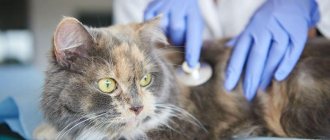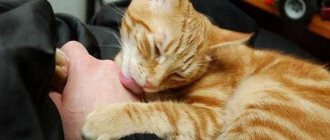Seeing your cat shake is alarming to any pet parent and should not be ignored. If your cat suddenly starts shaking, the first thing you need to do is talk to your veterinarian. They will discuss your cat's symptoms with you and advise you on what to do next. They can also decide whether your cat needs immediate veterinary care.
Your cat may be shaking his entire body or just part of it, such as his ears, head, paws, or tail. Trembling can also be described as twitching, tremors, spasms, or any abnormal movement that seems involuntary.
If possible, videotape your cat's behavior, as it is easier for your veterinarian to see what your cat is doing than to have to explain it to you.
What causes shaking in cats?
Unless your cat has other symptoms, it can be difficult to know what's causing the shaking without a veterinary examination. Your veterinarian will use his or her experience to determine the likely cause and begin the treatment your cat needs. In addition to examining your cat, your veterinarian may ask you questions about your cat's lifestyle to help narrow down possible causes, such as:
- Their activity levels
- Number of exits
- Any scavenger hunt or hunting
Your cat's age and condition can also help determine the cause of her shaking.
© shutterstock
Here are some common reasons why your cat may be shaking:
- Low body temperature
- High body temperature
- Anxiety
- Pain
- Disease
Trembling as a warning sign
Unfortunately, trembling can be a symptom of the development of many pathologies. Among them the most common:
– a lack of B vitamins and calcium can make a cat passive and indifferent; reconsider the diet if the pet is inactive, indifferent to treats and favorite games;
– infection with parasites (worms, fleas, ticks) is a common cause of intense trembling in animals;
– diseases of the musculoskeletal system (rinotracheitis) are manifested by frequent twitching of the limbs;
– severe trembling and convulsions may occur as a result of the development of meningitis, rabies, encephalitis, borreliosis;
– pneumonia manifests itself through severe chills, coughing, sneezing, and discharge from the sinuses;
– plugs in the ears, otitis media provoke twitching of the head;
Accompanying symptoms and restless behavior are a reason to consult a doctor
– damage by toxic substances causes slight trembling, which is gradually replaced by convulsions;
– severe trembling of the whole body and head may indicate internal injuries;
– lethargy, lack of appetite and trembling may be a consequence of the development of infection in the animal’s body;
– epilepsy is a dangerous disease that causes twitching of the whole body, increased salivation, decreased appetite, and “glassy” eyes;
– kidney dysfunction often manifests itself through trembling, which, if ignored, can cause urolithiasis;
Low body temperature
Your cat may have a low body temperature if it has been outside for too long in very cold or wet conditions. If this is extreme, we call it hypothermia. Kittens or very thin cats are especially at risk of hypothermia in harsh weather. Other symptoms of hypothermia include lethargy, slow reactions, or loss of consciousness.
Other causes of a low temperature could be shock, blood loss, toxins, poor circulation, or if your cat doesn't feel well and hasn't moved for several days.
If you think your cat is too cold, warm her up slowly and dry her fur if it's damp. You should call your veterinarian for advice if your cat still feels unwell after this.
Cold
One of the basic factors in the manifestation of tremor in a cat is the body’s reaction to exposure to cold. In this case, tremors may occur immediately after swimming or after long walks in winter.
Tremors are caused by severe hypothermia. At risk of hypothermia are cat breeds that are hairless or have thin fur. The owners of such animals should carefully approach the issue of additional insulation of the pet’s body.
High body temperature
If your cat has a high body temperature, she may also shake. The most common cause is a high fever in a cat. Cats with a fever are often lethargic and do not eat. Feeling the tips of your cat's ears is a useful way to determine if they are hotter than usual. If you think your cat has a fever, you should contact your veterinarian, especially if she is not eating.
Cats can also get heatstroke, causing a high body temperature called hyperthermia. Hyperthermia is more serious than the high body temperature caused by fever. Heatstroke is not as common in cats as it is in dogs, perhaps because most cats are indoors during the hottest hours of the day. However, it is still possible, so be careful on hot days. Other signs to look for are shortness of breath, leakage, rhythm, rapid breathing, tremors, or loss of consciousness. You will need to call your veterinarian as soon as possible if you suspect your cat has heatstroke.
Place cool, damp towels above or below your cat to lower its temperature or make it feel more comfortable until you can see your veterinarian.
Sexual hunting
Trembling in a cat's body is sometimes evidence that the animal is in a state of sexual arousal.
During the onset of sexual heat, the hormonal background of the animal changes. The characteristic trembling, rolling in waves, indicates an aggravation of all the animal’s senses; during the period of estrus, the pet senses various odors more clearly, so it can show its anxiety.
If the owner does not plan to breed cats in the future, experts recommend surgical intervention. Sterilization will not only save the animal from physical suffering during sexual hunting, but also reduces the risk of developing malignant tumors in the body. In some cases, the administration of sedatives is recommended.
Anxiety or pain
Cats that are shaking with fear or nervousness may look the same as cats that are in pain. If they don't have obvious signs of pain, such as a limp or a sore, it can be difficult to tell which ones they have. Anxiety or pain can cause involuntary tremors throughout the cat's body. They are usually random and your cat may simply shake for a short time, stop, and then shake again.
You may have noticed other symptoms such as poor appetite, lack of play, excessive grooming or lack of grooming. An anxious or sick cat will often hide and may hiss or spit if you approach it. Any of these signs in your cat indicates that you should seek advice from your veterinarian.
If your cat is in pain, your veterinarian will help determine the cause and prescribe pain medication if necessary. If anxiety is causing your cats to tremble, you may need to make some changes to your home to create a calmer environment. Your veterinarian can advise you.
© shutterstock
Pathological causes of tremor
The reason why the cat is trembling as if he is cold, although he is at home in comfortable conditions, may be pathological factors. In this case, tremor is often accompanied by the following clinical symptoms:
- photophobia;
- inactivity and lethargy;
- aggression;
- pain syndrome;
- increased body temperature;
- diarrhea or constipation;
- vomit;
- purulent discharge from the nasal cavity or eyes;
- impaired coordination of movements.
Often, the presence of pathology in a cat is indicated by trembling of individual parts of the body or muscle groups, when only the head, front or hind limbs shake.
Important! Tremor must be distinguished from convulsions, which are always accompanied by pain. In kittens up to 5-6 months of age, when their central nervous system is intensively developing, seizures can be physiological in nature. In other cases, seizures indicate the presence of serious disorders of brain function caused by infectious or traumatic factors.
There are many pathological reasons why kittens and adults tremble.
A deficiency of calcium and B vitamins in the body provokes degenerative processes in muscle tissue in cats.
The reason that the kitten is trembling may be infectious rhinotracheitis. In addition to tremor, this disease is accompanied by cough, purulent discharge from the eyes and nose, a significant increase in body temperature and digestive disorders.
With the development of helminthic infestations, when helminths clog the pet's intestines and release a huge amount of toxic products of their vital activity, the kitten experiences symptoms of intoxication, it becomes lethargic and trembles all over its body.
The body's response to the introduction of general anesthesia. If the cat shakes for more than 6 hours after surgery, this may indicate the development of internal bleeding. In this case, urgent medical intervention is necessary.
Body tremors in cats are provoked by acute inflammatory processes in the organs of the genitourinary system and attacks of urolithiasis.
Otitis media, caused by ear mites or other factors, leads to frequent head twitching. The cat scratches the sore ear, hits it, tilts its head towards the affected organ. As a result, scratches and hematomas appear in the ear area. Lack of treatment leads to inflammation spreading to the inner ear and meninges, which provokes death.
During acute liver failure, the cat develops vomiting and diarrhea; at the initial stage, it trembles slightly, and at the stage of failure of the affected organ, it trembles all over.
Head tremor may indicate traumatic brain injury, encephalitis, cerebellar lesions, or drug overdose.
If a kitten walks poorly and his whole body shakes, this may indicate spinal column injuries caused by congenital pathologies, compression or bruises. In adult cats, such symptoms are the result not only of injury, but also the development of tumors or deformation of the intervertebral discs.
If a kitten suddenly becomes lethargic, begins to tremble, first slightly, and then with increasing amplitude, then such tremors and lethargy most often indicate poisoning. If the baby is not taken to the clinic, he will develop seizures and die.
The cause of tremor may be borreliosis, which occurs after a tick bite. The insidiousness of the disease lies in its long latent period, when clinical signs may appear several months after infection.
Tremor combined with lethargy may be one of the signs of toxoplasmosis in cats.
If a kitten walks poorly, shakes, spins in place, or is poorly oriented in space, this may indicate that he has such a serious congenital pathology as hydrocephalus.
Tremors of the limbs, turning into convulsions, can occur in a cat during childbirth or within a week after it. This phenomenon is called eclampsia. It indicates an acute lack of calcium in the animal’s body. If left untreated, your cat will develop seizures, which can be fatal.
What to do if your cat is shaking?
The causes of shaking in cats are numerous and often difficult to diagnose without further investigation. Your cat's tremors are likely treatable, and you shouldn't wait until your cat's symptoms get worse. The sooner your cat receives a diagnosis and treatment, the better the outcome. The best thing you can do is call your veterinarian and speak with him to discuss your concerns.
Posted by Christian Adams An American expat living in Metro Manila, Philippines for over a decade, Christian is a lifelong cat lover and the proud father of two rescue cats, Trixie and Chloe. Both girls used to be among the crowds of homeless people who roam the cities and countryside. Three-year-old Trixie was rescued from a litter found under a neighbor's porch, and two-year-old Chloe was brought home by Christian's young son, Henry, who discovered the crying kitten in the parking lot.
Diagnostic measures
Having noted involuntary trembling in an animal, the first step is to distinguish external causes (hypothermia, overheating, fear, sexual arousal) from internal ones, eliminating previous events that could cause serious pathology. When visiting a veterinary clinic, tell the doctor about any potentially dangerous situations in the past that make you even slightly suspicious. Pay special attention to:
– number of repetitions and duration of trembling;
– presence of other symptoms;
– dates of the last deworming and vaccination;
IMPORTANT: If you have alarming symptoms, analyze the events that could cause the tremor and share the information with your doctor.
The examination will help identify disorders in the body.
The following will help to establish an accurate diagnosis:
– complete blood count, stool and urine analysis;
– radiography;
– MRI or CT scan of the brain;
– electromyography – to assess the bioelectrical activity of muscles;
– myelography – for diagnosing spinal cord tumors;
– puncture of cerebrospinal fluid to detect encephalitis;
When to contact a veterinarian
Why is my dog shaking, lethargic and panting?
A visit to a specialist is justified by the question of why a domestic cat’s body and paws periodically tremble. Veterinarians advise coming to the clinic if the following signs occur:
- aggressiveness;
- lethargy and apathy;
- frequent bowel movements;
- bouts of vomiting;
- intestinal disorders with constipation.
Veterinarian appointment
If the cat continues to freeze for no apparent reason and tries to lie down, then refusal of treatment can lead to serious consequences, even death.
Symptomatic treatment
Therapeutic methods for physiological sources of the problem:
- hypothermia - the animal is warmed up, a light massage is performed, and the wet fur is dried with a towel after washing;
- overheating - cooling with compresses, the cat is allowed to drink on demand;
- stress - removing the source of fear, creating peace and quiet;
- sexual arousal is suppressed with special drugs.
Treatment of the pathological origin of muscle tremors is carried out with antibacterial agents, replenishment of vitamin and mineral deficiencies, and operations to remove tumors.
Furry pets are in excellent health; if the cat begins to shake with small tremors, then you need to undergo a diagnostic examination and find out the original source of the abnormal condition. Ignoring the problem can lead to the development of unpredictable consequences for the health of the animal.
Video











